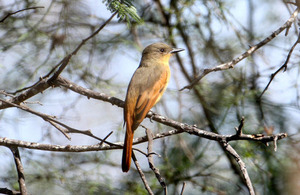Birding Rally Challenge in Peru identified 864 species
British team comes second in international birding competition in northern Peru.

Rufous Flycatcher
A British team of birdwatchers, the ‘Forest-Falcons’, together with five other teams from Brazil, South Africa, Spain and the United States took part in the Birding Rally Challenge in northern Peru in June. The goal was to see as many bird species as possible in eight days on a set route. The route, which started on the coast in Chiclayo and ended to the east of the Andes in Tarapoto, took the teams through several distinct habitats. The British team came second, logging an impressive 601 species. In total the six teams identified a combined total of 864 species, roughly 10% of the world’s birds.
The rally was organized by the Inkaterra Association, an NGO dedicated to research, conservation and community development, together with the Commission for Promotion of Peru for Exportation and Tourism (PROMPERU). It is hoped the rally will become a regular event, covering different regions of Peru, with the aim of highlighting Peru’s astonishing biodiversity, encouraging ecotourism, and promoting community conservation projects.

Buff Bridled Inca Finch
The British Ambassador, James Dauris, attended the launch of the event on 11 June together with Vice-Minister of Tourism, Claudia Cornejo. He commented: “Peru is home to more than 1,800 species of birds, more species of birds than any other country in the world apart from Colombia. Of these about 100 are endemic – found only in Peru and no other country in the world. They reflect the extraordinary biodiversity that Peru is blessed with. It is one of the most exciting countries in the world for birdwatchers to visit. The development of the ecotourism industry in Peru has an important part to play in supporting the efforts of local communities, government and NGOs to deal with the problems being caused by the illegal timber, mining and drugs trades that are doing so much damage in the Amazon and elsewhere.”